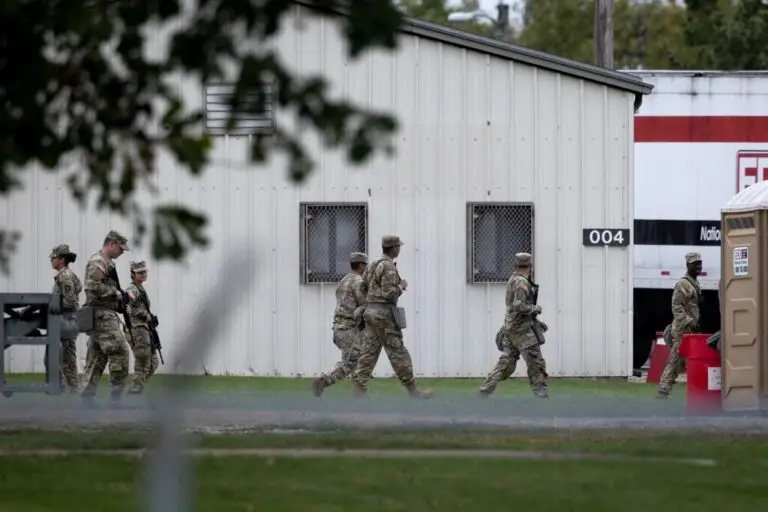Chicago, Illinois – In a move fueling national debate, hundreds of Texas National Guard troops have quietly arrived outside Chicago, sparking political backlash, constitutional questions, and fears of federal overreach. The deployment comes under direct orders from former President Donald Trump and has been met with staunch opposition from Illinois leadership.
Deployment Under Fire
The troops’ presence at a staging facility near Elwood, southwest of Chicago, signals what may become one of the most contested federal interventions in recent history. Though the stated purpose is to protect federal buildings and staff, state officials view it as a provocation. Illinois Governor JB Pritzker has denounced the operation as “unlawful” and “unwanted,” declaring that any forced presence of federal troops in Illinois constitutes “an occupation without consent.”
Meanwhile, legal teams for the state of Illinois and the city of Chicago are already moving to challenge the deployment in court, asserting that the federal government is attempting to bypass state authority for political gain.
From Los Angeles to Lake Michigan
This is not an isolated event. Similar deployments—some already underway—have taken place in Los Angeles and Washington, D.C., with others ordered to Memphis and Portland. What connects them is less crime statistics and more a pattern: these are cities governed by Democrats, all of whom have resisted federal intervention.
Former President Trump has repeatedly invoked rhetoric about “lawless cities,” calling them potential “training zones” for federal forces. Critics argue the deployments are not grounded in objective risk assessments, but in an attempt to paint blue cities as chaotic battlegrounds requiring a show of military control.
The Legal Minefield
At the heart of the controversy is whether the President can use the National Guard without a governor’s approval. While federal authority permits intervention to protect federal assets, the threshold for overriding state resistance is typically high—and rarely reached.
A federal judge in Illinois has so far held off on granting an emergency injunction to block the troops, but a full hearing is expected later this week. The judge noted that the legal complexities involved—balancing federal interests with state sovereignty—require full examination.
Insurrection Act in Play?
Sources close to the administration confirm that the Insurrection Act, a seldom-invoked 1807 statute allowing the use of military force to quell domestic disorder, is under consideration. Trump hinted at it during a press conference, saying, “We have tools for this kind of chaos. If mayors or courts try to stop us while people are dying, we’ll act.”
The suggestion sent shockwaves through legal and civil liberties circles. Invoking the Insurrection Act without demonstrable rebellion or lawlessness could set a precedent with lasting ramifications for civil-military relations in the U.S.
Escalation or Overreach?
Supporters of the deployment argue that federal intervention is necessary to restore law and order in cities that they believe have lost control. But critics counter that the crime statistics do not match the administration’s narrative—and that ordinary policing, not military intervention, is the correct tool.
Civil rights advocates warn of a slippery slope: what begins as a “protection mission” could evolve into an intimidation strategy against political opposition.
What’s Next
With the legal showdown looming and troops stationed just outside city lines, Chicago now stands on the edge of a constitutional standoff. The coming days will determine whether this show of force becomes a permanent fixture—or a flashpoint that reignites a national debate over power, politics, and the role of the U.S. military within its own borders.






